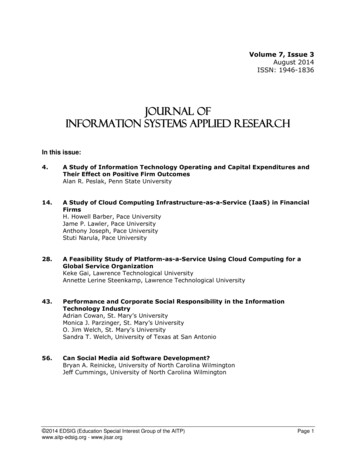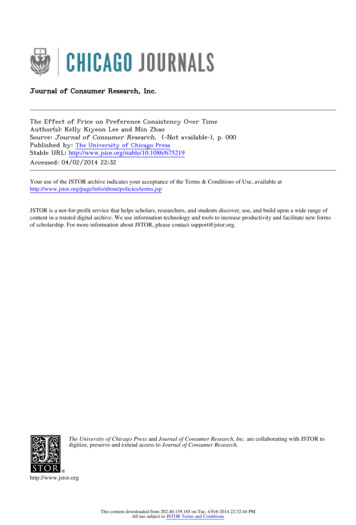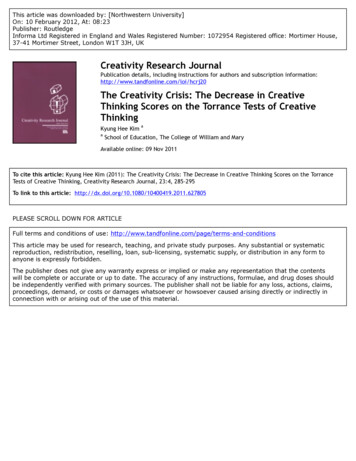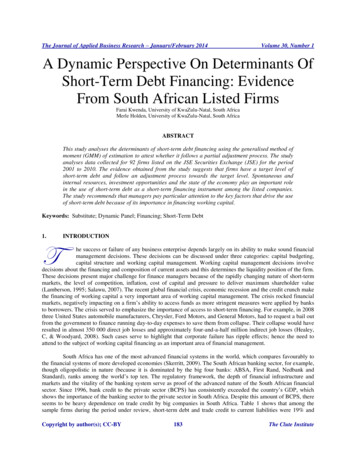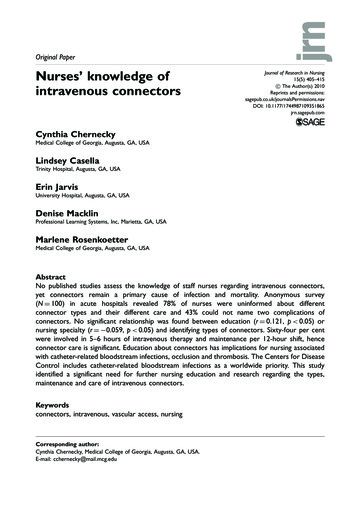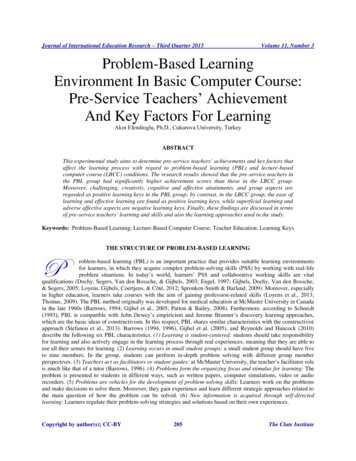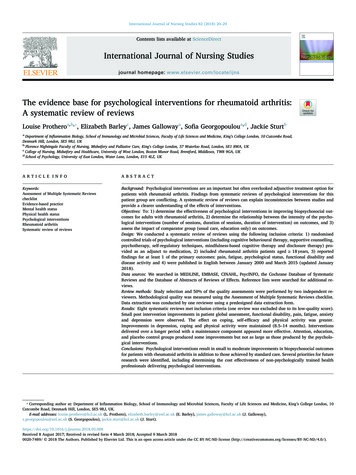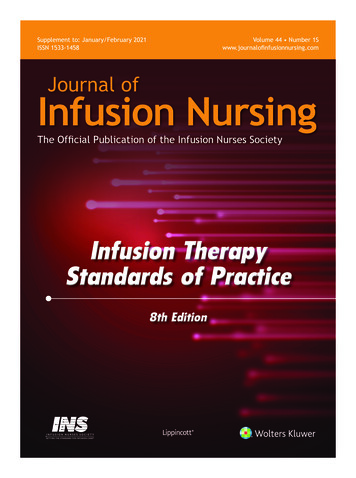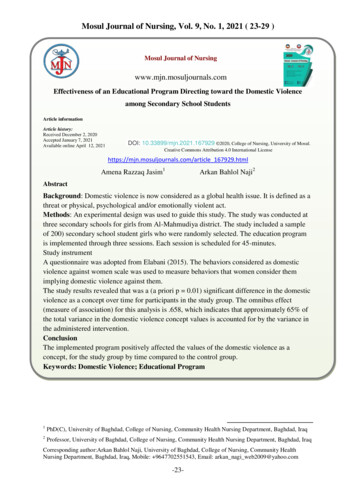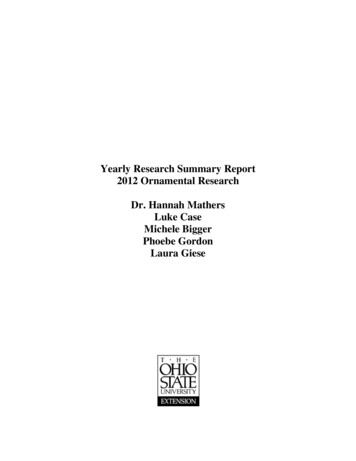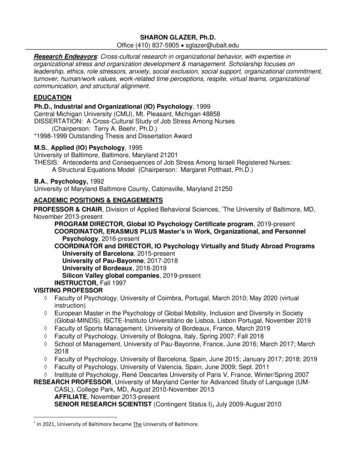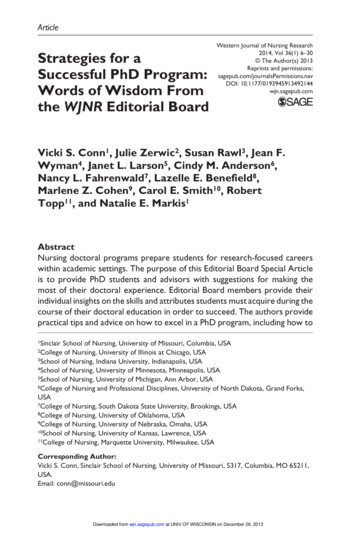
Transcription
492144 italic Western Journal of Nursing Research /italic Conn et al.ArticleStrategies for aSuccessful PhD Program:Words of Wisdom Fromthe WJNR Editorial BoardWestern Journal of Nursing Research2014, Vol 36(1) 6 –30 The Author(s) 2013Reprints and : 10.1177/0193945913492144wjn.sagepub.comVicki S. Conn1, Julie Zerwic2, Susan Rawl3, Jean F.Wyman4, Janet L. Larson5, Cindy M. Anderson6,Nancy L. Fahrenwald7, Lazelle E. Benefield8,Marlene Z. Cohen9, Carol E. Smith10, RobertTopp11, and Natalie E. Markis1AbstractNursing doctoral programs prepare students for research-focused careerswithin academic settings. The purpose of this Editorial Board Special Articleis to provide PhD students and advisors with suggestions for making themost of their doctoral experience. Editorial Board members provide theirindividual insights on the skills and attributes students must acquire during thecourse of their doctoral education in order to succeed. The authors providepractical tips and advice on how to excel in a PhD program, including how to1SinclairSchool of Nursing, University of Missouri, Columbia, USAof Nursing, University of Illinois at Chicago, USA3School of Nursing, Indiana University, Indianapolis, USA4School of Nursing, University of Minnesota, Minneapolis, USA5School of Nursing, University of Michigan, Ann Arbor, USA6College of Nursing and Professional Disciplines, University of North Dakota, Grand Forks,USA7College of Nursing, South Dakota State University, Brookings, USA8College of Nursing, University of Oklahoma, USA9College of Nursing, University of Nebraska, Omaha, USA10School of Nursing, University of Kansas, Lawrence, USA11College of Nursing, Marquette University, Milwaukee, USA2CollegeCorresponding Author:Vicki S. Conn, Sinclair School of Nursing, University of Missouri, S317, Columbia, MO 65211,USA.Email: conn@missouri.eduDownloaded from wjn.sagepub.com at UNIV OF WISCONSIN on December 26, 2013
7Conn et al.select an advisor and a dissertation committee, the importance of attendingconferences to increase visibility and develop a network of colleagues,presenting and publishing research while still a student, and balancing workand personal life. Students who take full advantage of the opportunitiesavailable to them during the course of their doctoral programs will graduatewell prepared to take on the multiple responsibilities of research, teaching,and leadership.Keywordsdoctoral education, nursing, academic programsNursing schools are facing faculty shortages nationwide even as the numberof nurses graduating with PhDs has remained relatively flat over the pastdecade (American Association of Colleges of Nursing, 2012). Nursingschools need every PhD-prepared faculty schools can get. For this reason, itis critical that those individuals who are entering or currently in PhD programs be properly trained to ensure that they will be successful in their subsequent academic careers. Nursing PhD programs typically provide studentswith multiple resources for them to develop the skills necessary to becomeeffective researchers, educators, and leaders. However, whether studentsproperly avail themselves of those resources is an important determinant ofthe overall quality of the training they ultimately receive. The purpose of thisEditorial Board Special Article is to provide tips and advice to students onhow they can maximally benefit from their doctoral experience. Several strategies are summarized in Table 1. Board members’ guidance comes from theirexperiences in mentoring doctoral students as well as their own graduateschool experiences.Jean Wyman, PhD, RN, FAAN, FGSA, Universityof MinnesotaPreparing for a career as a nurse scientist begins on the first day of one’s PhDprogram. Dr. Angela Barron McBride (2010) in her book, The Growth andDevelopment of Nurse Leaders, highlights the importance of mentorshipthroughout all career stages, and it is particularly vital in the first stage ofpreparation for an academic or research career. An experienced mentor playsa crucial role in guiding a doctoral student through the design of a scholarlycareer development plan, assisting in navigating the challenges of doctoraleducation, and helping with professional networking that can lead toDownloaded from wjn.sagepub.com at UNIV OF WISCONSIN on December 26, 2013
8Downloaded from wjn.sagepub.com at UNIV OF WISCONSIN on December 26, 2013CourseworkDoctoral studiestrajectoryCareer planning Mentoring(continued)Find an advisor with a vigorous active program of research (e.g., strong publication record)Select an advisor with a record of mentoring successful doctoral studentsVerbalize expectations in the advisor–student relationship; be willing to negotiate activitiesBecome familiar with the advisor’s substantive and methodological expertiseInvolve the advisor in decisions about committee membersSelect a committee with methodological or substantive expertise for the dissertation project; the committee may include individuals outside the field of nursing Meetings with mentors: Schedule with considerable lead time Provide written documents well before meeting Use an agenda to be sure all topics and questions are addressed Record important decisions and action plan If necessary, change mentors to optimize experiences Articulate career goals (e.g., research position in a clinical organization, faculty at a research extensive university, faculty in ateaching-focused institution) Develop career goals consistent with the desired position Implement specific doctoral program activities to promote the career trajectory Design a doctoral studies trajectory to prepare for the intended career Develop timelines and milestones for doctoral program activities Reassess the trajectory each semester to record completed activities, monitor ongoing experiences, and develop new plans Specify activities outside the formal coursework to obtain valuable experiences Prioritize academic and nonacademic activities to achieve professional and personal goals Learn to relinquish activities that do not further professional and personal goals Devise strategies to avoid distractions from completing work Develop time management skills (Chase et al., 2013) Consider a full-time doctoral study to enhance doctoral experiences Focus on coursework assignments to complement research area Build a program of study to build both content expertise and research skills Seek publication opportunities related to course assignmentsStrategiesThemeTable 1. Strategies for a Successful Doctoral Education.
Downloaded from wjn.sagepub.com at UNIV OF WISCONSIN on December 26, 20139Dissemination skillsGrantsmanshipDissertation topicValuable experiencesbeyondcourseworkThemeTable 1. (continued)(continued)Participate in informal and formal research seminars, webinars, and the likeAttend a research conference in the initial yearPresent research (including collaborators’/mentors’ projects) at conferences in subsequent yearsAttend both specialty conferences and general nursing conferences (Harpin & Gilmore-Bykovskyi, 2012)Be a graduate research assistantSeek research practicum experiences to build substantive and methodological experiencesVolunteer on research teamsParticipate in research interest groupsExplore possible dissertation topics early in the program of studyPick a research topic overlapping with advisor’s research expertiseSpend extensive time reading about the dissertation topicDevelop individual searchable database of the dissertation relevant literatureSelect a topic with a high significance (i.e., affecting a large number of people, having significant morbidity/quality of life/mortality/cost outcomes) Use course papers to build expertise around dissertation methods and substantive area Undertake interdisciplinary coursework or courses outside of nursing Design a research project that builds new knowledge Build a dissertation that will have a scientific impact by affecting future research, practice, theory, or policy (Cohen et al., 2010;Conn, 2010) Craft the dissertation to launch a research career Select a research project that is feasible during the period of doctoral education Seek opportunities for funding early in the program (Rawl, 2014; Groves et al., 2012) Develop applications for funding doctoral education/dissertation Seek constructive criticism on grant application materials Resubmit grant applications if necessary to achieve funding Assess skills for writing manuscripts and for delivering poster and podium presentations Develop a plan to increase competencies for dissemination, such as preparing abstracts, PowerPoints, and posters for research presentations delivering presentations at research team meetings, campus research seminars, and at conferences developing manuscripts Seek feedback about presentation and publication materials to further develop skills Enhance writing skills Strategies
10Downloaded from wjn.sagepub.com at UNIV OF WISCONSIN on December 26, 2013Become socialized toresearch cultureTeaching skills, ifrelevantLeadership andcollegial skillsNetworkingPublicationsThemeTable 1. (continued) Develop a plan for multiple publications during the initial semester; reassess the plan and progress each semesterConsult with the advisor and course faculty regarding publication possibilities for course papersIdentify publication opportunities by participating in research practicums or research projectsDevelop writing behavioral goals with timelinesDiscuss publication possibilities for the dissertation with the entire committeeSelect manuscript-style dissertation, if availableDevelop a list of experts on the dissertation topic; design strategies to meet expertsAttend conferences each yearAttend meetings with mentors when feasible; ask them to make introductions to expertsReview abstracts prior to conferences to strategically plan participationDeliberately introduce self to experts at a conference; plan two to three specific questions to ask each expertParticipate in student groups focused on dissertation topics or methodsBuild and maintain a relationship with other PhD students and recent graduatesVolunteer for student, school, and professional association committees (Harpin & Gilmore-Bykovskyi, 2012)Observe leadership activities in research teamsSeek leadership opportunities in committees, task forces, and so forthProvide constructive criticism of colleagues’ and faculty’s workConsider curriculum and instruction courseworkParticipate in informal and formal seminars about teaching, instructional technology, and so forthServe as a graduate teaching assistantVolunteer for teaching experiencesSocialize with professional colleaguesLocate successful role models among professional colleagues; articulate the characteristics that make them successfulLearn persistence and tenacityExpect challenges and occasional disappointments/delaysDevelop an appreciation for opportunities to revise and further improve written workAccept the reality that productivity is often measured by publications and grantsWelcome lifelong learning (Conn, 2014)Strategies
11Conn et al.important career opportunities not just during the PhD program but in thefollowing years as well. Although a mentoring team will be essential to helpprepare a student for dissertation research, the academic advisor has a majorrole as the primary mentor.How does one select a primary mentor? If you have a choice, and mostdoctoral students do get a choice to suggest initially or change their assignedacademic advisors, it is important that you know yourself well and have realistic expectations for what you need in a mentor. Having an overnight turnaround on papers and email requests is probably not feasible for most facultymembers. Reach out and get to know different faculty, their research interests, and how these interests might fit to your own. Negotiate for what youneed in a mentoring relationship. For example, what is the best time youwould want someone to provide feedback on your developing research ideas?Would you like someone to provide constructive critique on a manuscript forpublication or a mock presentation you will be giving at a conference? Howoften would you like advising appointments, how far in advance do theseneed to be scheduled, and whether phone, Skype or in-person appointmentsare preferable? Ideally, students should meet at least once a semester or quarter to discuss their plans and progress with their mentor.Second, identify individuals who have the characteristics of being agood mentor. These are faculty who are actively involved in the same typeof research that you are interested in or are using the methodology youwould like to use. A good mentor is someone who is concerned about students’ success in the graduate school, and is interested in helping them toadvance their short- and long-term academic and professional goals. Assesswhether the individual faculty member has an opportunity for you to assistin his or her project as a paid or unpaid research assistant (RA); whether thefaculty member sees any publication opportunities resulting as a first authoror coauthor is important information to know. Select a mentor who hasemotional intelligence, and is self-confident, skilled, and holds himself orherself at a high, ethical standard. In selecting a mentor, it is also helpful tochoose someone you can get along with, although this individual is notexpected to be a close friend. Good mentors will advise, guide, facilitate,support, and protect, but they will also challenge you at times to help yougrow.Key tips in working with your mentor include the following: (a) schedulean appointment with as much lead notice as possible; (b) identify time neededand the purpose of the meeting; (c) come prepared with an agenda, and summarize the action plan at the end of the meeting; and (d) follow up with briefmeeting notes of key decisions. These tips will facilitate your mentoringrelationship.Downloaded from wjn.sagepub.com at UNIV OF WISCONSIN on December 26, 2013
12Western Journal of Nursing Research 36(1)One of the most helpful planning tools for facilitating success in thedoctoral program and preparing for a scientific career is the scholarly careerdevelopment plan. Your mentor can be a great resource and should beactively involved in helping you develop this plan early in your doctoralprogram. Although the format for plans varies, it typically includes broadgoals, expected competencies, coursework, and other activities (e.g., grantwriting conferences, writing manuscripts, submitting abstracts, attendingresearch conferences, research or teaching assistantships, internships,attending journal clubs or research seminars, etc.) along with a time frame.As you develop your plan, it is helpful to identify goals in three key domainsespecially if you are pursuing an academic career: research, education, andleadership. Although you may not focus on taking formal courses in curriculum and instruction, you may want to look for opportunities that willhelp prepare you to be an effective presenter, such as noncredit courses inthe use of instructional technology and active learning strategies as theseincrease your presentation effectiveness. In terms of leadership goals, ifyou have not been involved in professional societies at the local, regional,or national level, this is the time to consider being active to begin developing your leadership skills and your professional network. For example, youmay want to consider getting involved as a student representative on a committee for your regional nursing research society or on a committee for alocal or national specialty society. The career development plan should bemonitored every semester in conjunction with your mentor to determinewhat competencies have been met, whether new goals or activities aredesired, or whether there is a need to readjust the timeline. The activitiesand the resulting outcomes from this plan will help you develop the necessary competencies as a beginning scientist, initiate your program ofresearch, and help you gain professional networks that could help in garnering later career success.Janet Larson, PhD, RN, FAAN, University ofMichiganI have two types of advice, an advice to facilitate the completion of highquality doctoral education and an advice to advance your career after receiving the doctoral degree. One of the primary purposes of a PhD degree is toprepare you to be an independent researcher and my advice is designed topromote the quality of your research and the trajectory of your researchcareer.The fit between a research advisor and a student is important to your success. Identify an advisor who is an expert researcher in an area of interestDownloaded from wjn.sagepub.com at UNIV OF WISCONSIN on December 26, 2013
13Conn et al.that is closely aligned with your interest. Pick a research topic that you loveor can love and one that is closely aligned with the expertise of your researchadvisor. If your advisor is an expert in your research topic, he or she will beable to guide you more effectively and efficiently. An advisor with expertisein the research that you are conducting will help you avoid many pitfalls inyour research and will be able to guide and support you so that your researchis truly cutting edge. Without this kind of expert guidance, you will makemistakes that could have been avoided, and your research will have lessimpact.On the more pragmatic side, keep your dissertation to a manageable size.Remember that it is the beginning of your program of research and the dissertation should provide a solid foundation for future research. You do not have toanswer all of the research questions that you have, so save some for later.The dissertation is a major project, and you should commit as much timeas you can, 5 to 7 days a week. Structure your time, set goals, and keepmoving. Do not expect others to push you and do not drag out the processso that you lose your motivation. Your advisor will guide you, but you haveto own it. You have to take charge and go for depth and excellence in yourresearch.During your doctoral program, you will be socialized to operate withina new culture, the research culture. Watch other successful researchers,observe their performance and note what they do well and what they couldhave done better. You will learn much about the research culture.Networking with classmates and other researchers will be important inpromoting your academic career. To accomplish this, I recommend thateach year students attend at least one scientific meeting that is closelyaligned with their research area and a regional nursing research meeting.At the specialty scientific meeting, you will meet the experts in your specific area, and by networking with them, you will increase your visibilityand your opportunities as you move forward with your research career. Atregional nursing research meetings, such as the Midwest Nursing ResearchSociety, you will meet a wide range of nurse researchers and this willincrease your visibility and opportunities in academic nursing. Both areimportant. It may seem expensive at the time, but this is an importantinvestment in your career.Be prepared to compete in the academic job market. People will judgeyour future capacity by the work that you have done during your doctoralstudies. So publish with your advisors; volunteer to work on one of theirprojects with the agreement that you will be part of a publication. It will takeextra work, but it could be important in competing for a postdoctoral fellowship or faculty position in a research intensive environment.Downloaded from wjn.sagepub.com at UNIV OF WISCONSIN on December 26, 2013
14Western Journal of Nursin
practical tips and advice on how to excel in a PhD program, including how to 1Sinclair School of Nursing, University of Missouri, Columbia, USA 2College of Nursing, . Vicki S. Conn, Sinclair School of Nursing, University of Missouri, S317, Columbia, MO 65211, USA. Email: conn@missouri.edu
